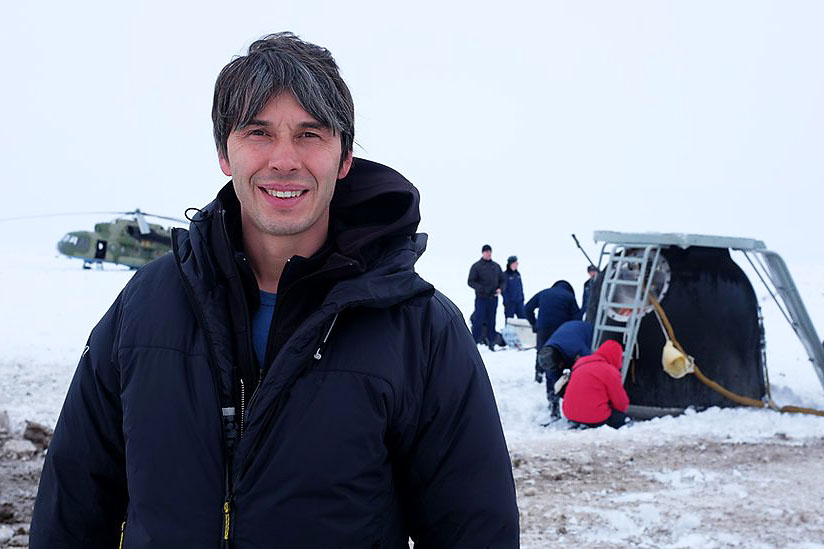Brian Cox specialises in communicating the mysteries of the universe to television audiences, but one of the great mysteries is the communicator himself. It would make more sense if he were several people. He is a professor of particle physics, part of an international team working with the Large Hadron Collider in Switzerland, which was the subject of the recently released film Particle Fever. As one of the inner circle of wits on Stephen Fry’s QI, he keeps pace with professional comedians on flights of improvised lunacy. He’s also a former rock star. Yes, really. During his undergraduate years he was keyboard player for D:Ream, which scored a number one single and several other hit records in the 1990s. And he’s recently been cast as God in the stage version of Monty Python’s Life of Brian.
Cox’s most recent television series, Human Universe, is screening on ABC1. This is the fourth series Cox has made for BBC Two, and you do have to wonder how someone whose subject is, unashamedly, life-the-universe-and-everything can differentiate one series from the next. The titles aren’t much help – Wonders of the Solar System, Wonders of the Universe and Wonders of Life were the first three – though the wonders seem to have gone missing this time around.
Cox is widely regarded as David Attenborough’s successor and, as broadcasters, they encounter the same paradox: if the whole planet is your subject matter, and you have the resources to take your camera crew just about anywhere, how do you avoid repeating yourself? Ah yes, that’s Attenborough again, intimately chatting up a tree frog in some jungle, whispering to camera as he observes a colony of mountain apes, or lying on the sand watching giant turtles beach from the pre-dawn tide. Any of these could be a scene from pretty well any of his programs, and we’ve seen versions of most of them many times in the course of his career.
Cox has the problem in, if anything, a more acute form. How many times can you visit the universe at large – with its stars, planets and galaxies, its light particles, magnetic fields and soundwaves – and still have something distinctive to say? The problem is that we have become accustomed to being whizzed around the planet – and off it – on our TV screens. Whether it’s the shores of the Galapagos, the peaks of the Andes, the polar ice floes or a view of the Pleiades from a desert in central Australia, it’s all business as usual for viewers.
The challenge for the presenter is to break through this feeling of familiarity with a presence and a narrative that make you watch because you want to listen. And there seem to be two schools of thought in the documentary business about how to do this.
According to the first, the viewer’s attention is seen through the lens of the entropy principle: we out there in couch-potato land must be constantly jerked into reanimation by an onscreen personality who exudes energy at every turn. With exuberant body language and constant proclamations of what is fantastic, amazing and exciting, the type A presenter arrests us mid-yawn and lassoes our straying attention back into the world of wonders.
The second school is derived from astute training programs for teachers and actors, and its core technique is counterpoint. If your audience is noisy, lower your voice. If they are shuffling in their seats as if they are about to leave, slow down. If their attention is caught by the slightest distraction, narrow your focus to a detail. Both Attenborough and Cox are type B presenters. They are quiet, calm and relaxed because they have a genuine understanding of how human concentration works.
Calm people are good to watch, though when it comes to watchability, Brian Cox has a lot else going for him. He looks like Ben Whishaw as the romantic poet John Keats in Jane Campion’s film Bright Star – and, in fact, the Keats connection has other interesting resonances. In a sonnet from 1816, the poet describes feeling “like some watcher of the skies, when a new planet swims into his ken.” (This is thought to be a reference to William Herschel’s discovery of Uranus.) The poem concludes with the famous image of the Spanish explorer Cortés looking out over the Pacific, “silent upon a peak in Darien.”
Cox has a way of finding great vantage points around the globe and just standing there, so you’re not so much watching him as watching with him. In Human Universe, he climbs the tower of a Hindu temple in Rajasthan overlooking a massive crater, circles over Easter Island in a helicopter, and visits ancient sites in the Peruvian high Andes. At the end of the second episode, he takes a glass elevator high above the Tokyo skyline at night, and speaks to camera: “We’ve known for some time that we’re infinitesimal specks in a vast universe, but now the suggestion is that we’re infinitesimal specks in a vast infinity of universes.”
Keats would have his mind blown all over again by this quantum leap in the scale of things. But new worlds, new planets, new galaxies… are we simple mammals really cognitively equipped to have any meaningful sense of such shifts in scale? Keats’s description of the point at which the brain reaches its outer limits was “negative capability,” which he glossed as a capacity for “being in uncertainties… mysteries, doubts, without any irritable reaching after fact and reason.” Fact and reason are core business for scientists, but anyone who saw Particle Fever will be aware that researchers in this area of science are well advanced in negative capability. They can spend their entire careers on a hypothesis that may be proved wrong.
Good television science requires a dynamic balance of knowledge and uncertainty. If it’s all about the transmission of knowledge, the inevitable insistence on how fascinating it all is gets very wearing very quickly.
There’s a risk in presenting “science” as the only domain of true and proper knowledge in the human universe, and that risk looms very large right now, with the growing political tensions over climate change.
In 2012 Brian Cox was awarded the president’s medal at the Institute of Physics in London for his achievements in “promoting science to the general public and inspiring the next generation of physicists.” In his acceptance speech, he began on an optimistic note: “I believe we are entering a new golden age of physics.” Applications for physics courses at universities were going up, perhaps as a reflection of high-profile breakthroughs such as those being made with the Large Hadron Collider and its eighty-country collaboration. It was a tremendous cultural triumph, he said, prompting Peter Higgs, after whom the Higgs particle was named, to make the typically modest acknowledgement that “it’s very nice to be right sometimes.”
But before we start ringing in the golden age, we have to do something about all those alarm bells deafening us from the tabloid press, the demons of Fox “News” and their like. Cox reminded his audience that in the lead-up to the widely publicised trial run of the Collider, the Daily Mail ran the headline, “Are we going to die on Wednesday?” There were predictions of massive earthquakes, mega tsunamis, disasters in random patterns. Seas would start to boil, mountains would crumble… Well, it was 2012, after all, a year well celebrated in the Roland Emmerich movie.
Cox is certainly someone who can enjoy the melodramas of popular imagining. But even so, he wanted to sound a warning note in the speech. He quoted Carl Sagan: “We live in a society entirely based on science.” For a modern scientific democracy to function, Cox added, a fair percentage of the population needs to be educated in scientific principles. This matters because there is a point at which collective failures of understanding could put the entire human species at risk. In the United States, says Cox, they spend more on pet grooming than on nuclear fusion research. “You can comb your own cat and put the money into clean energy. It’s about education. There’s either education or dictatorship.”
Alarm bells, it seems, ring at both ends of the spectrum. What we like to call knowledge and what we presume to call ignorance can converge in a common human impulse to envisage disaster for those who don’t think like we do. That doesn’t mean that they’re as bad – or good – as each other. It’s the science communicator’s job to steer a path between them.
Cox does this not by pontificating about how science knows best, but by acknowledging the limits of scientific knowledge and focusing on the particulars of what and how we know. In Human Universe, he does this with exemplary skill.
“Science is a humble pursuit,” he says. It’s about observing regularities that make our world predictable. A cup that is knocked off a table will always fall. It doesn’t sail upwards. The meanders of a river seem to make random patterns, but there are consistencies in their ratios.
On the big questions, like how or why atoms came together to form us, we’re faced with an intersection of randomness (what we don’t or can’t know) and pattern (what we do know). Cox invites us to watch a cricket match being played on a pitch near the banks of the Ganges. It’s a combination of rules and accidents. Then, in a transition that has all the appearance of randomness, he goes to a camel race. He takes some cells from a camel’s mouth, and from his own, and compares them under a microscope, where they look like planets floating in space. There are similarities. In an ancient world of single-cell organisms, chance collisions produced symbiotic relationships that evolved into more complex organisms through natural selection, which has its rules and laws.
One of the problems for those who commit themselves to the public understanding of science is the precarious nature of facts and explanations in the scientific understanding. The grounds of evidence and interpretation are always shifting, and if you took account of all the qualifications and provisos, you’d have even the most dedicated viewers yawning. Not surprisingly, Cox has come under some severe criticism from other scientists. A television lecture he gave on quantum mechanics in 2011 provoked heated attacks from colleagues who accused him of misrepresenting the relationship between energy fields and creating a simplistic picture of how “everything is connected to everything.” Colleagues in physics and astronomy from the University of Nottingham came to his defence, offering a forensic view of his wording. Meanwhile, the statement was being taken up by “new age mystics” as support for the idea that all consciousness is interconnected. On that point, Cox offered a refutation in the Wall Street Journal.
Scientific explanation can be a fraught business because there is a lot at stake. A recent article in the Guardian accuses Cox of offering “a fatally flawed view of evolution” in his current series by talking about “our uniqueness as a species” and implying that evolution has singled us out for some kind of peak status as intelligent life forms. The author was Henry Gee, a senior editor of Nature and author of a recent book entitled The Accidental Species: Misunderstandings of Human Evolution.
Human evolution is an area of science where negative capability is in sadly short supply, and Gee’s book is a plea for more of it. What’s needed, he says, is “an intuitive understanding that the more we find out, the more our ignorance grows.” I like this statement, with its picture of ignorance expanding like the galaxy itself. Imagine what we may not know in a hundred or a thousand years’ time. If we’re still here, and the more wilful kinds of ignorance have not killed us off.
The sophisticated communicator of science to the public has to steer a course between these two kinds of ignorance: a state of expansive unknowing, versus a prejudice against research-based forms of understanding. Without some respect for the first, science becomes the subject of a kind of preaching that only serves to entrench resistance to it. Cox may at times present his subject matter in ways that reduce its complexity, but his overall steerage is quite trustworthy. •




